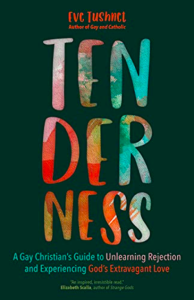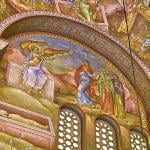Tonight is the vigil of Christ’s Ascension. Forty days after he rose from the grave, he rose from the earth itself and went bodily into heaven. Most dioceses in the US transfer this solemnity to the following Sunday, but the Ordinariate observes it on the traditional date, the sixth Thursday in the Easter season.

Interestingly, this aligns Ascension with two other festivals also celebrated on Thursdays—Maundy Thursday and Corpus Christi. (1) The first opens the Triduum, commemorating the institution of the Eucharist and the new law, Love one another as I have loved you; the second, at two months’ remove from the intense drama of the Passion, focuses on the Eucharist itself, allowing a more lingering, deeper contemplation of the mystery that the dramatic rhythm of the Triduum is less suited for.
I’ve long felt that there is something fitting in linking the Ascension with the Blessed Sacrament. In the gospel of John, the most ostentatiously liturgical and eucharistic of the four, the Crucifixion, Resurrection, and Ascension are treated virtually as a single act, a single movement of exaltation. The Son of Man must be lifted up is one of the recurring themes throughout the whole book. The Ascension is not directly depicted in John—only Luke’s two accounts do that (2)—but it is implied, and on the same day as the Resurrection itself. When St Mary Magdalene meets him, Jesus tells her Touch me not, for I am not yet ascended to my Father, but only three verses later, on the evening of the very same day, he is showing the disciples his hands and his side, presumably in much the same way he does with St Thomas the next week. And at the same time, John is the gospel of the Bread of Life discourse, where he tells the crowds that they must chew on his flesh in order to have life, (3) the one where he compares himself to the seed that must die to bear fruit and the vine that the branches must remain upon. Maundy Thursday, Ascension, and Corpus Christi, taken together, accent the celestialization of matter and of the body that the Incarnation accomplished.
This context also gives the significance of the Ascension itself something of a twist. It’s easy to see the Ascension as a rather melancholy feast. It may have been for the infant Church. After the single most traumatic, horrible event of their lives, set in motion by a traitor whom they’d trusted and during which they had nearly all proven failures, their rabbi had come back to them from the dead. And then they had seen him intermittently for about a month, while they had returned to their old careers as fishermen (you can practically hear the “Well, I guess” before St Peter’s I’m going fishing in John 21). And then—majestically, thrillingly, yet for all that, again—he was gone. That first novena, the nine days between the Ascension and the outburst of Pentecost, sound to me like a quietly but intensely apprehensive time.
But the link with the Blessed Sacrament changes that. The last thing Jesus told them in the gospel of Matthew is Lo, I am with you always. Without the sacraments, that sounds like a mere sentiment. Not that there’s anything wrong with mere sentiment, but it’s a sorry-looking substitute for the Shekinah brooding upon the Ark of the Covenant, the literal divine luminosity that could speak or kill or transfigure, and which possessed a “with you” that could be straight up found on a map. That real presence is returned by the Real Presence, and now It can be anywhere, not just metaphorically but literally and visibly there. The boundary between earth and heaven, never intended to be permanent, is suddenly pierced at a million points in space-time—and every one of those points a single point, the same little piece of bread and cup of wine, as if a needle pulled a single golden thread through a million points of fabric and tugged them all together.

(1) Corpus Christi was originally instituted in the thirteenth century, set for the Thursday after Trinity Sunday. It is now typically transferred to the following Sunday, except in a handful of countries where it is a holy day of obligation.
(2) With apologies to the shorter and longer endings of Mark, now universally judged by scholars to be later additions.
(3) This is a feature of the Greek text that most English translations fail to convey—perhaps out of a misplaced sense of delicacy. In John 6, Jesus says repeatedly and in various ways “You must eat my flesh”; in verse 54, the author moves from using an ordinary word for “eat” to a word that specifically means “gnaw, chew.”
















